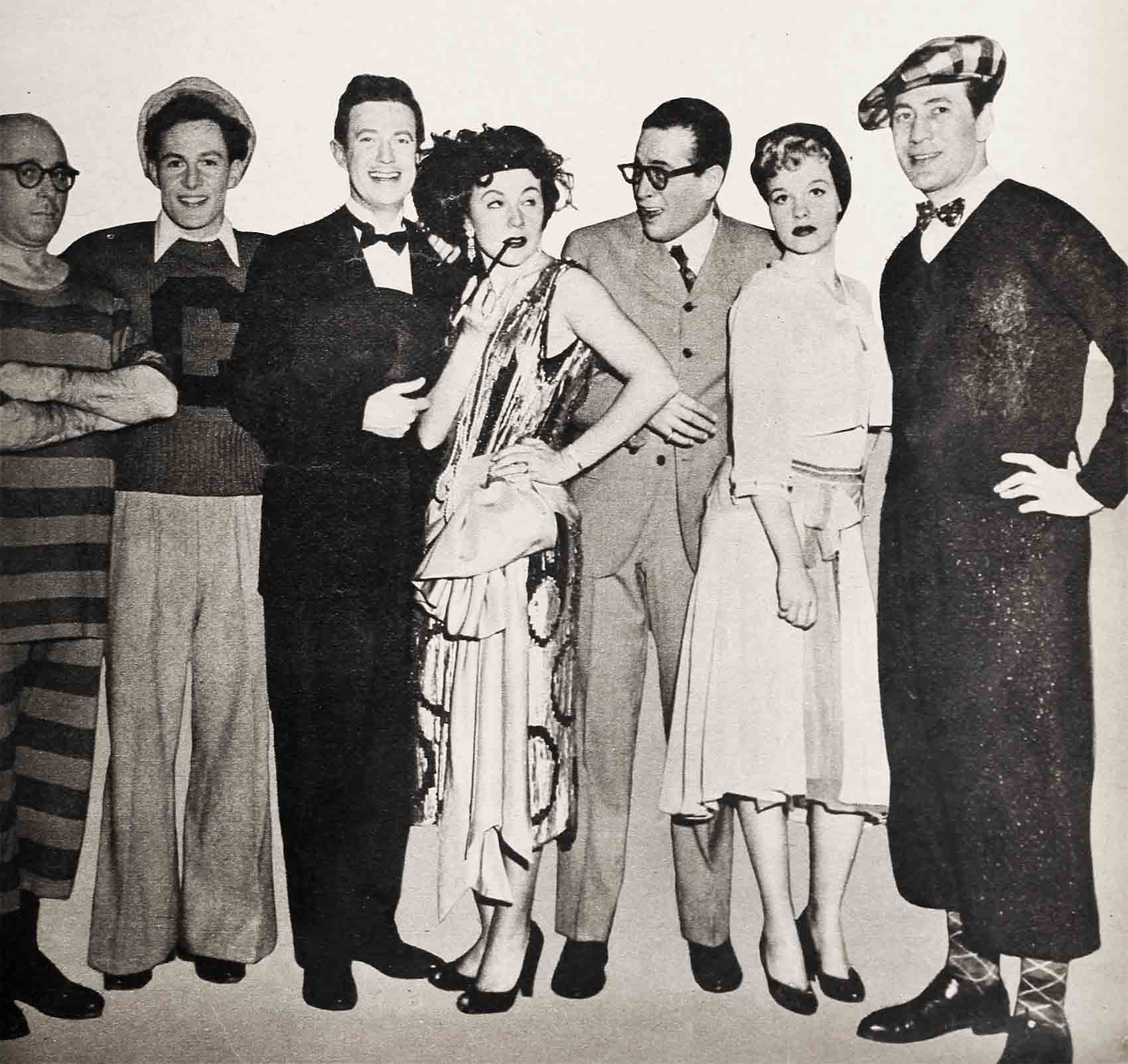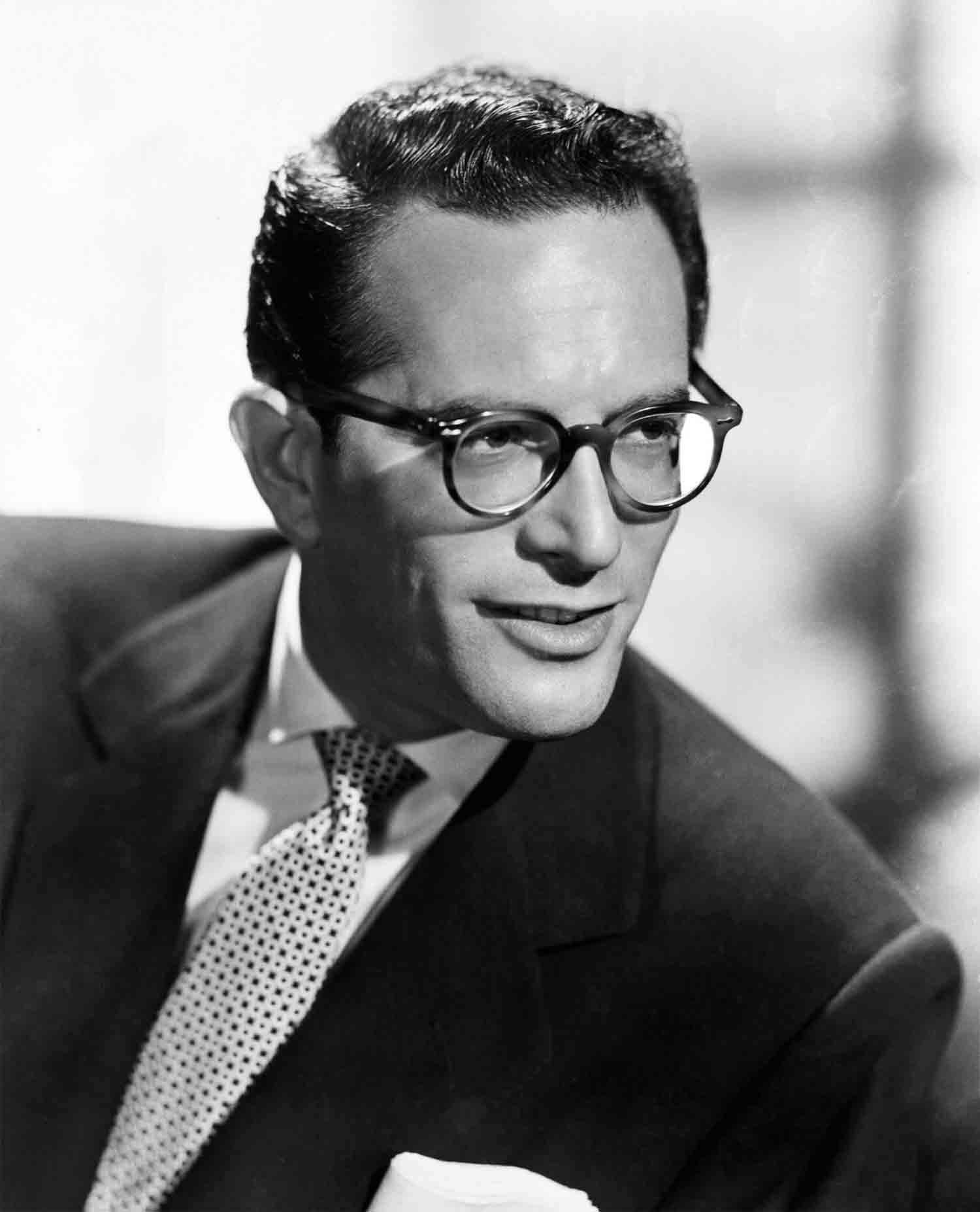
The “Q” Stands For Luck—Robert Q. Lewis
What I want most to do,” Robert Q. Lewis told me, “is to help kids get the breaks I got. I was lucky, and I want to pass my luck along.”
Robert Q., horn-rimmed and sport-shirted, sat behind the big, cluttered desk in the library-TV room-office of his five-room apartment overlooking the river on Manhattan’s Upper East Side. It’s a comfortable, luxurious room in brown and gold, one wall lined with hundreds of books and records. Framed theatrical announcements and posters hang on the walls, a gorgeously-colored Indian feather headdress is mounted over the couch, and a score of his favorite totem poles are displayed on the bookshelves. Completely equipped for work or play, even down to an electric pencil sharpener contributed by a friend to the “man who has everything,” it’s the Ivory Tower of a New Yorker whose interests range the world.
“There are so many young people with talent, kids who deserve and need that one break,” Bob went on. “Take for instance Fred Elton. I was looking for an accompanist go along on my Las Vegas night club venture a couple of years ago. During rehearsal one day I asked our orchestra leader, Archie Bly, if he knew of anyone who would suit me. One of the station page boys overheard he, buttonholed me later, and asked for a chance to cry out.”
Bob grinned. “Of course, I groaned inwardly—who wouldn’t? Who has time to waste? But I listened to him, and the kid was good. I hired him and took him along to was Vegas. Now he’s on a daytime TV show. I think someday he’ll be a great song writer.”
There was Bob Cone, too, now one of the writers on “Robert Q. Lewis Show” (4:30 P.M. EDT, CBS-TV Network). While Lewis was airing his patter over WHN several years ago, he noticed a stranger in the control room goggling at him. The next day the same lad, who seemed to have nothing to do with the workings of the program, was still staring with eager absorption. Curious, Robert Q. asked about him and found that he was a casual visitor, a vague acquaintance of one of the control-room engineers.
Now intrigued for real, Mr. Spectacles made a point of asking the boy whether he could do anything for him He realized that he had led with his chin when the goggler asked to be allowed to submit a test script. “Oh Lord,” thought: Bob, “what have I let myself in for?”
But he had hit the jackpot again. He had found a mine of talent.
“It’s almost always by accident that you find talent,” Bob went on, his eyes looking very brown and serious behind the big horn-rims. “I say I’ve been lucky, because I’ve always known, as far back as I can remember, what I wanted to do. I’ll bet half the readers of SCREENLAND know too. I can’t tell them how to grab the brass ring. but if you think it would help, I’ll tell them how I did it.”

Bob leaned back in the desk chair and closed his eyes, sending his thoughts back to the beginning of things. He was born, he said, on April 5, 1921, in New York City, the elder son of a successful, prosperous lawyer. As a child he found New York a magically enchanting place to live. Central Park and Riverside Park were his playgrounds. At school he met the whole world. He loved people, and a New York public school has all kinds of people. He loved the theatre, and he and his father had a standing date on Sunday afternoons to go to the 81st St. or Riverside theatres. They even had the same seat each week, right behind the drummer. Today, Bob can still repeat, line for line, most of the old vaudeville routines, although, he says, he doesn’t know how he heard them over the boom-boom.
The summer of 1940, when he was nineteen, he decided not to join his family in their annual trek to a Long Island beach, but to swelter out a job. Meeting a friend for lunch in the building at 101 Park Avenue, he saw on the building directory in the lobby that there was a radio station, WCNW (now WLIB) located there. He walked in and offered them an announcer for free. They took him up on it, and he worked for them all summer without adding a dime to his exchequer. But he added a big sum to his wallet of experience.
After three years of college, jam-packed with acting, writing and: directing with the University of Michigan Players, he felt the hot breath of the Army on the nape of his neck. In another year he would be drafted. He wanted a job to come back to when the war was over. So, at the end of his Junior year he decided to leave college, and go to work to build that job.
“I wrote to all the radio stations within 500 miles of New York, asking for a job as staff announcer. With my letter I enclosed a portrait, a biography, and a recording of my voice. On the recording I did all the things a staff announcer should do,” Bob said. “Of course, the previous summer’s experience with WCNW was an invaluable asset. I got two answers, one from Wheeling, West Virginia, and the other from Troy, New York. Both asked for personal interviews. Troy sounded nearer to home, so I went up, was auditioned, and got the job. Mother still has my wire, ‘Got job, $100 a month. Whoopee!’ ”

In Troy Bob was sweeper-up in every sense of the word. He opened the station in the morning, awoke the Trojans with a few early-bird ditties, carried the family through breakfast with the morning news, entertained the tots with fairy tales, helped mom with her menus, and spun discs for the teen-agers. He worked fourteen hours a day. He learned every job a staff announcer could do. He made friends. Making friends has been a Robert Q. specialty all his life.
Bob’s Army experience was brief, and typically, all tied up with show business. Assigned to the Army Air Corps to learn radio operating and mechanics, his boredom with the technical end of radio transmission inspired him to produce a camp show. He went on an eighteen-hour-a-day schedule, which in six weeks landed him in the hospital with pneumonia, and finally resulted in a Certified Medical Discharge. In January, 1943, depressed and discouraged, he was back in civilian circulation. He felt his luck had deserted him.
But it hadn’t. “This was one of those times that taught me that what seems to be a disaster often turns into a lucky break,” Bob said. “I think we all have to learn that. When everything’s going along fine you don’t have to look in new directions, and you usually don’t. But when you’ve lost your job and the wolf starts howling, you’ve got to jump. Often you jump into a better job than you had before.”
Almost immediately Bob got himself a job at WNEW as a disc jockey, and within a year went to the national air lanes on a comedy show. For seven years he bobbed up in place of a vacationing or ailing Arthur Godfrey, subbing for the redhead. He M.C.’d his own radio and television programs, “Waxworks,” and the “Robert Q. Lewis Show.” He invaded the night club terrain at the Thunderbird Cafe in Las Vegas, making the field his own. His next expedition was into the strawhat circuit in “Charley’s Aunt,” with victory again at the till.
Nowadays he’s to be seen five afternoons and one evening a week on CBS television, and heard Saturday mornings on CBS radio. To fans and intimates who ask for the story of the “Q”, which stands for nothing, Bob explains that it happened by one of those sub-conscious accidents. He’s really, legally, just plain Robert Lewis. But signing off one morning show he added a flourish by saying, “This is Robert Q. Lewis bidding you goodbye.” The resulting mail was heavy and provocative, so he has hung on to his “Q”. In trying to analyze how he happened on it, Bob recalls that the great humorist Lemuel Q. Stoopnagel was another of his childhood gods.
“Where do I want to go from here?” Bob was just ready to give an answer when the phone rang. After several minutes of complicated negotiations with his agent, juggling sponsor names and hours with easy facility, he came back to Robert Q.’s future. “My great ambition is to retire at forty-five. People ask me why I’m working myself to death now. That’s why. Do you know how much I’ll need? Half a million dollars, and Im on my way to having it. I want to buy a fifty-or sixty-foot boat. There’s so much to do, so many books to read, so many places in the world to see, so many people I’d like to know.”
Bob hastened to add that retirement did not mean that he was planning to leave television permanently. To him, retirement means doing the kind of show he wants to do. For instance, he’d like to have another program similar to his “The Show Goes On,” which was a showcase for young talent.
“You haven’t asked me if I’m happy!” Bob laughed. “I am—one of the few people I know who is happy. Why? Because I’m successful in my work. I have my ups-and-downs, but basically I have what I want and that’s happiness. I had a strange childhood; my parents have been married for thirty-eight years and are as much in love as ever. We were a close-knit family and the hardest thing for me, growing up, was to find that my heroes had their seamy, cracky sides. They weren’t all heroes, just as I’m not either; but it was the hardest thing I had to face, learning that good people weren’t necessarily all good.”
THE END
—BY FRANCES ADLER
It is a quote. SCREENLAND MAGAZINE JULY 1954




